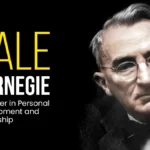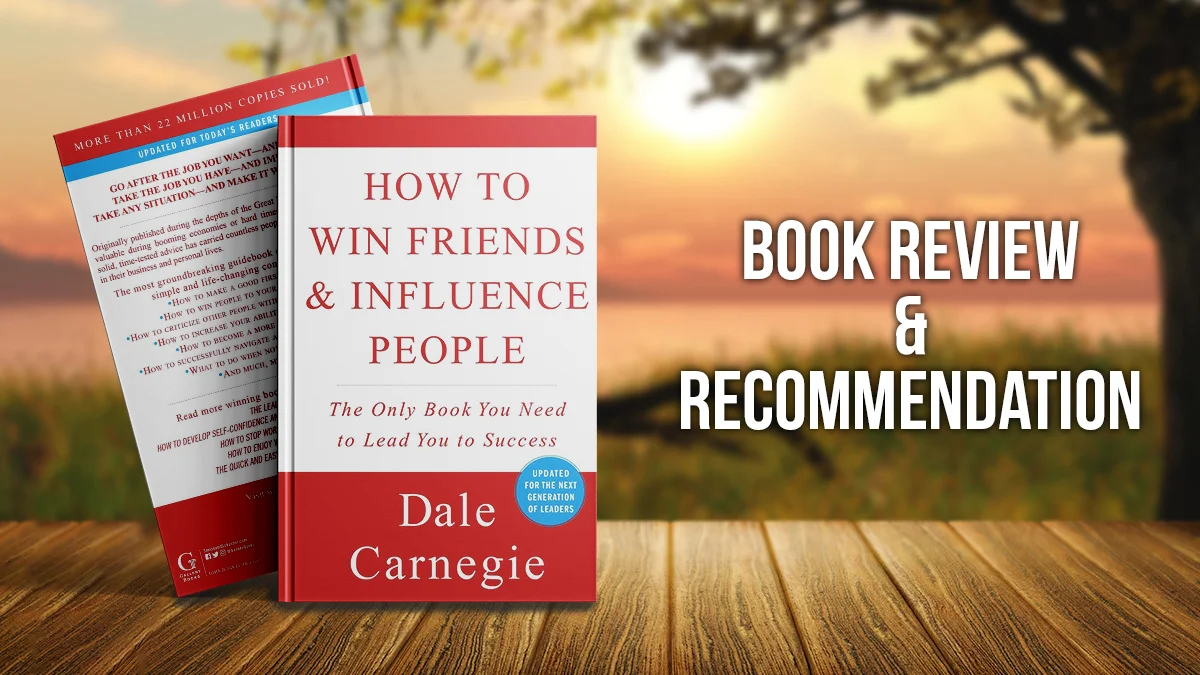Transform Your Life with “How to Win Friends and Influence People” by Dale Carnegie

Benjamin Graham: The Father of Value Investing
June 30, 2024
Dale Carnegie: A Pioneer in Personal Development and Leadership
June 30, 2024Transform Your Life with “How to Win Friends and Influence People” by Dale Carnegie

How to Win Friends and Influence People by Dale Carnegie
Table of contents
- Overview
- Part 1: Fundamental Techniques in Handling People
- Part 2: Six Ways to Make People Like You
- Part 3: How to Win People to Your Way of Thinking
- Part 4: Be a Leader: How to Change People Without Giving Offense or Arousing Resentment
- Part 5: Letters That Produced Miraculous Results
- Practical Applications and Real-Life Examples
- Why You Should Read It
- Conclusion
Today, I’m excited to introduce you to a timeless masterpiece that has transformed the lives of millions worldwide – "How to Win Friends and Influence People" by Dale Carnegie. Whether you’re looking to improve your social skills, build better relationships, or enhance your leadership qualities, this book offers practical advice that’s as relevant today as it was when it was first published in 1936. Here’s why you should make it your next must-read.
Overview
"How to Win Friends and Influence People" is a self-help classic that provides a comprehensive guide to improving your interpersonal skills. Dale Carnegie, a pioneer in public speaking and personality development, offers timeless principles that can help you navigate social situations with confidence and ease. The book is divided into four major parts, each packed with actionable advice and real-life examples. It consists of 30 chapters in total, with each part focusing on different aspects of human relations and leadership.
Key Quote from the Book: "You can make more friends in two months by becoming interested in other people than you can in two years by trying to get other people interested in you."
Part 1: Fundamental Techniques in Handling People
Carnegie emphasizes the importance of dealing with people in a way that makes them feel valued and appreciated. By understanding human nature and employing empathy, you can create positive interactions and build strong relationships.
Key Points:
- Don’t criticize, condemn, or complain: Criticism often backfires and leads to resentment.
- Give honest and sincere appreciation: Acknowledging others’ efforts and achievements fosters goodwill.
- Arouse in the other person an eager want: Show people how they can benefit from your ideas or suggestions.
Key Quote from the Book: "The deepest principle in human nature is the craving to be appreciated."
In this section, Carnegie explains that criticism is futile because it puts the other person on the defensive and usually makes them strive to justify themselves. Instead, he suggests using praise and honest appreciation to influence people. By showing sincere interest in others and acknowledging their efforts, you build a foundation of mutual respect and cooperation.
Part 2: Six Ways to Make People Like You
Building rapport is crucial for personal and professional success. Carnegie’s principles help you connect with others on a deeper level, making you more likable and approachable.
Key Points:
- Become genuinely interested in other people: Show curiosity and attentiveness.
- Smile: A simple smile can go a long way in making a positive first impression.
- Remember that a person’s name is, to that person, the sweetest sound in any language: Use names frequently and respectfully.
- Be a good listener: Encourage others to talk about themselves.
- Talk in terms of the other person’s interests: Find common ground and show genuine interest.
- Make the other person feel important – and do it sincerely: Validate others’ feelings and perspectives.
Key Quote from the Book: "The only way to get the best of an argument is to avoid it."
Carnegie emphasizes the power of a smile and genuine interest in others. He advises that by remembering and using people's names, listening actively, and discussing their interests, you can build strong, positive relationships. He also highlights the importance of making others feel important and doing so sincerely, as this can significantly impact their perception of you.
Part 3: How to Win People to Your Way of Thinking
Persuasion is an art, and Carnegie provides a blueprint for influencing others without creating resistance. His techniques help you present your ideas compellingly and persuasively.

How to Win People to Your Way of Thinking
Key Points:
- Avoid arguments: They rarely lead to positive outcomes.
- Show respect for the other person’s opinions: Even when you disagree, acknowledge their perspective.
- If you are wrong, admit it quickly and emphatically: Honesty and humility build trust.
- Begin in a friendly way: Approach conversations with warmth and openness.
- Get the other person to say “yes, yes” immediately: Build momentum with agreement.
- Let the other person do a great deal of the talking: People appreciate being heard.
- Let the other person feel that the idea is theirs: Encourage ownership and collaboration.
- Try honestly to see things from the other person’s point of view: Empathy fosters understanding.
- Be sympathetic to the other person’s ideas and desires: Show that you care.
- Appeal to the nobler motives: Inspire others by appealing to their better nature.
- Dramatize your ideas: Make your points vividly and memorably.
- Throw down a challenge: Encourage action by presenting a challenge.
Key Quote from the Book: "When dealing with people, remember you are not dealing with creatures of logic, but creatures of emotion."
Dale Carnegie provides numerous strategies for winning people over to your way of thinking. He advises against arguments and encourages showing respect for others' opinions. By admitting your mistakes quickly, starting conversations on a friendly note, and building agreements, you create a positive environment for persuasion. Additionally, letting others talk more, feeling that the idea is theirs, and showing empathy are crucial steps in influencing others effectively.
Part 4: Be a Leader: How to Change People Without Giving Offense or Arousing Resentment
Effective leadership requires tact and sensitivity. Carnegie’s strategies help you inspire and motivate others while maintaining positive relationships.

Be a Leader How to Change People Without Giving Offense or Arousing Resentment
Key Points:
- Begin with praise and honest appreciation: Start with positive reinforcement.
- Call attention to people’s mistakes indirectly: Use subtlety to address issues.
- Talk about your own mistakes before criticizing the other person: Share your experiences to create a non-threatening environment.
- Ask questions instead of giving direct orders: Encourage participation and initiative.
- Let the other person save face: Protect others’ dignity and self-esteem.
- Praise the slightest improvement and praise every improvement: Reinforce progress with consistent encouragement.
- Give the other person a fine reputation to live up to: Set high expectations with confidence.
- Use encouragement: Make the fault seem easy to correct.
- Make the other person happy about doing the thing you suggest: Motivate with positive reinforcement.
Key Quote from the Book: "Abilities wither under criticism; they blossom under encouragement."
In this section, Carnegie focuses on the subtleties of effective leadership. He suggests starting with praise and appreciation before addressing mistakes. By sharing your own errors first, you create a more receptive environment for feedback. Asking questions rather than giving orders encourages involvement and ownership. Protecting dignity, praising improvements, and setting high expectations are key to motivating others without causing resentment.
Part 5: Letters That Produced Miraculous Results
This section showcases the power of written communication. Carnegie shares examples of letters that achieved remarkable results by employing his principles. These letters demonstrate the effectiveness of positive reinforcement, empathy, and understanding in written form.
Key Points:
- Use positive language: Frame your requests or feedback in a positive manner.
- Show genuine appreciation: Express sincere gratitude for others’ efforts.
- Address the recipient’s needs and desires: Tailor your message to resonate with the reader’s perspective.
Key Quote from the Book: "Three-fourths of the people you will ever meet are hungering for sympathy. Give it to them, and they will love you."
Carnegie illustrates how the principles of effective communication can be applied to writing letters that inspire, persuade, and build strong relationships.
Practical Applications and Real-Life Examples
Key Quote from the Book: "If you want to gather honey, don’t kick over the beehive."
Carnegie's principles are not just theoretical; they are grounded in practical applications and real-life examples. Throughout the book, he shares stories of individuals who have successfully applied these techniques to improve their personal and professional lives. For instance, he recounts how a businessman used sincere appreciation to turn a disgruntled customer into a loyal one, or how a manager improved employee morale and productivity by emphasizing positive reinforcement.
These examples demonstrate that the principles in "How to Win Friends and Influence People" can be applied in various contexts, from customer service and management to personal relationships and social interactions.
Additional Insights: Modern Relevance
While "How to Win Friends and Influence People" was published in 1936, its lessons remain incredibly relevant today. In our digital age, where communication is often mediated by screens and social media, Carnegie's emphasis on genuine human connection is more important than ever. Whether networking on LinkedIn, collaborating with colleagues via Zoom, or maintaining friendships through messaging apps, the principles of sincere interest, active listening, and empathy can enhance your interactions and build stronger connections.
Key Quote from the Book: "The royal road to a man’s heart is to talk to him about the things he treasures most."
In today's fast-paced world, taking the time to show genuine interest in others and appreciate their perspectives can set you apart and foster meaningful relationships.
Why You Should Read It
- Timeless Advice: The principles in this book are as effective today as they were in 1936. They offer practical solutions to common social and professional challenges.
- Actionable Tips: Carnegie provides clear, actionable steps that you can start implementing immediately.
- Real-life Examples: The book is filled with engaging stories and examples that illustrate the power of these principles in action.
- Broad Applicability: Whether you’re looking to improve your relationships, enhance your professional skills, or become a more effective leader, this book has something for everyone.
Key Quote from the Book: "A person’s name is to that person the sweetest sound in any language."
Conclusion
"How to Win Friends and Influence People" is more than just a book; it’s a guide to transforming your approach to human interactions. Dale Carnegie’s wisdom offers invaluable lessons in empathy, communication, and leadership that can help you build stronger relationships and achieve greater success


